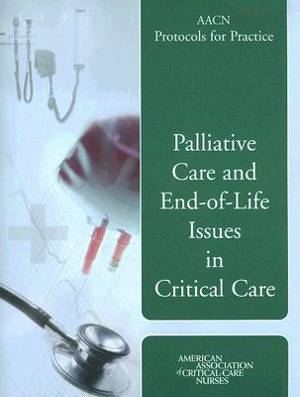
Bedankt voor het vertrouwen het afgelopen jaar! Om jou te bedanken bieden we GRATIS verzending (in België) aan op alles gedurende de hele maand januari.
- Afhalen na 1 uur in een winkel met voorraad
- In januari gratis thuislevering in België
- Ruim aanbod met 7 miljoen producten
Bedankt voor het vertrouwen het afgelopen jaar! Om jou te bedanken bieden we GRATIS verzending (in België) aan op alles gedurende de hele maand januari.
- Afhalen na 1 uur in een winkel met voorraad
- In januari gratis thuislevering in België
- Ruim aanbod met 7 miljoen producten
Zoeken
Aacn Protocols for Practice: Palliative Care and End-Of-Life Issues in Critical Care
.
Justine Medina, Kathleen Puntillo
€ 94,95
+ 189 punten
Omschrijving
Critical care nurses spend more time with patients and families facing the end of life than any other health care professional. Nurses are intimately involved in all aspects of end-of-life care and they are in position to address the variety of needs facing individuals at this juncture. Expert nursing care has the potential to greatly reduce the burden and distress of those at life's end and the ability to offer support for the many physical, psychological, social, and spiritual needs of patients and their families.AACN Protocols for Practice: Palliative Care and End-of-Life Issues in Critical Care sets forth the evidence-based guidelines for providing appropriate care, whether aggressively life-saving or palliative end-of-life care. The Protocols equip critical care nurses to effectively manage the following: symptom managementfamily issues and interventionwithholding and withdrawing life supportcommunication and conflict resolutioncaring for the caregiverAdditionally, the text includes a state-of-the-science review that provides guidance to critical care nurses while acknowledging the limited evidence-based research that exists.AACN Protocols for Practice are authoritative evidence-based practice resources for use by clinicians, educators, and researchers. Each series of protocols makes recommendations for the application, practice, and monitoring associated with a device, procedure, or practice.These protocols are designed to promote evidence-based practice by providing the latest patient care research findings in a format that is easy to understand and integrate into clinical practice. The protocols can be used to guide care in a variety of clinical situations in acute care, progressive care, or even in the home. Each protocol is introduced by a case study, which is followed by general information about the technology, occupational hazards, ethics considerations, competency issues, and practice recommendations. Recommendations are rated according to the level of evidence that is available to support the statement. Annotated bibliographies, suggested readings, and cross references provide guidance for learning more about the specific device or patient care system. (c) 2006 60 pages
Specificaties
Betrokkenen
- Auteur(s):
- Uitgeverij:
Inhoud
- Aantal bladzijden:
- 60
- Taal:
- Engels
- Reeks:
Eigenschappen
- Productcode (EAN):
- 9780763740276
- Verschijningsdatum:
- 1/03/2006
- Uitvoering:
- Paperback
- Formaat:
- Trade paperback (VS)
- Afmetingen:
- 214 mm x 273 mm
- Gewicht:
- 185 g

Alleen bij Standaard Boekhandel
+ 189 punten op je klantenkaart van Standaard Boekhandel
Beoordelingen
We publiceren alleen reviews die voldoen aan de voorwaarden voor reviews. Bekijk onze voorwaarden voor reviews.









